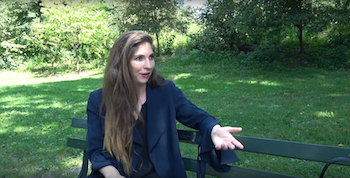
Jung Ye-bin is a senior studying Information and Communication Engineering at a co-ed university. She is a model student who worked hard to earn a GPA near perfection. At the end of the spring semester, her academic advisor promised her an internship at Sony which only had a single opening. As she was writing her cover letter to apply for the post at the beginning of the summer break, however, the professor suddenly notified the spot was given to another guy in his junior year. The internship’s qualification was clearly stated the applicant must be at the final year of school.
Under the patriarchal social norm, some Korean professors have the notion that while women will later quit her job when she becomes pregnant, men will have to take financial responsibility of their family as the breadwinner. Professors, thus, often choose to support male students even if they are less qualified than a fellow female student
The word feminism, derived from the word female, first used under the struggle to attain women’s rights. Nowadays, the word’s definition has expanded to include a wider spectrum of gender equality, including the LGBTQ community and point out that men too benefit from feminism.
“Meaningful cultural change can’t and won’t happen when only half of the population works toward that change,” said Canada’s Prime Minister Justin Trudeau as he joined the HeForShe campaign conducted by U.N. Women.
For the last edition of the three series of overseas coverage, Ewha Voice met Natalina Schappach, a New York University (NYU) student, who discussed on why feminism is not women’s burden alone, but what all sexes, political and culturally diverse groups should and are participating in. Lee Sook-jin, an Ewha alumna and the vice minister of Ministry of Gender Equality and Family (MOGEF), emphasized why striving gender equality benefits men.
Encompassing sexual, political, and cultural diversity
Many Koreans first heard of HeForShe from Emma Watson’s speech at the United Nations, asking everyone to take action. The campaign emphasizes inclusive feminism in gender issues that is applicable to all.
Natalina Schappach, a senior at NYU studying International Relations, was inspired by the U.N. Women’s HeForShe mission. She hoped to effectively spread its message by making a documentary featuring various NYU students and faculty members who described the necessity of everyone’s participation.
“A lot of more traditional feminism movements have been women-centric and I think that’s a mistake,” Schappach said. “You can’t expect big changes without involving the male half of the population, and that’s what HeForShe aims for. Getting men involved in the conversation is integral because why would men support something that they thought they were being excluded from?”
As important as advertising the necessity of creating conversation surrounding gender equality is, the more visible changes resulted from HeForShe projects attracted Schappach into contributing in the campaign.
“Specifically, I’m most passionate about ending child marriages in Malawi which is a tangible result that made life better for many women,” she said.
With her devotion to spread the messages that HeForShe conveys, she concluded that social media was the key to reaching a larger audience. With no knowledge on directing or producing a film, she sent out emails to friends and heads of different clubs to gather potential teammates who could actualize her plan.
“I expected, if I was lucky maybe three or four people would turn up to this meeting,” Schappach recalled. “But when I went to the coffee house, we basically took up the entire coffee house. There weren’t enough seats for everybody who came. I was shocked, excited by that response, but a bit overwhelmed.”
The documentary featured interviewees of diverse age groups, races, and gender, including celebrity students attending NYU: AnnaSophia Robb, from Charlie and the Chocolate Factory and Carrie Diaries, and Suraj Sharma, from Life of Pi. After Elizabeth Nyamayaro, the head of HeForShe, came across the documentary, she asked it to be played at a HeForShe event that was held at Museum of Modern Art (MOMA) where Justin Trudeau, Emma Watson, diplomats, and business leaders passionate about gender equality were also present.
Schappach emphasized that men are not the only group of people finding themselves excluded from the conversation on gender issues.
“There is a sharp divide between people who identify as liberals and people who identify as conservatives,” she said. “More so than ever there has been a focus on characterizing and excluding people from conversations based on stereotypes. The narrative right now, unfortunately, is that the whole conservative group of people don’t believe in women’s rights – that’s not the case.”
She also emphasized the importance of looking at the issue in a culturally and religiously diverse context, rather than merely through the western lens.
“It’s important to realize that people are going to be different types of feminists,” she said. “Specifically looking at Islamic feminists, for example, there are women who want to focus on working with the sections of the Koran, and those who want to move away from the Koran altogether.”
Schappach criticized the traditional western perspective of feminism for being narrow and homogeneous.
“A lot of people don’t know that feminism movements actually started in Egypt – that was where they really started to grow,” she added. “It’s not effective for people to consistently look to white feminism as its root and say that that’s where we should focus on.”

